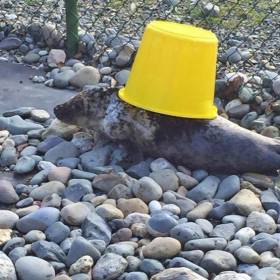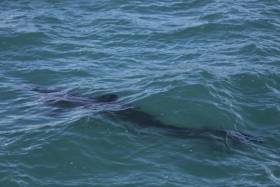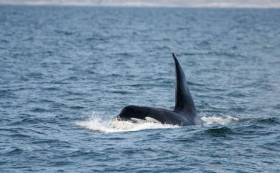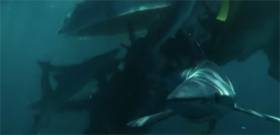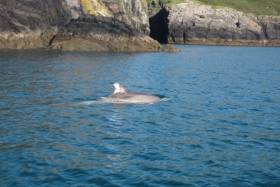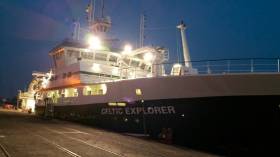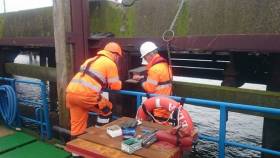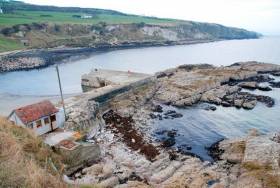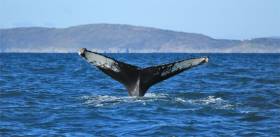Displaying items by tag: marine wildlife
Seal Pup 'Poison Ivy' Fighting Fit For Return To The Wild
#MarineWildlife - A seriously ill seal pup found on the streets of Galway last December is just weeks away from release back into the wild.
As previously reported on Afloat.ie, the tiny seal no more than three weeks old was found by Galway City Council workers on a footpath in Salthill.
After emergency care by local vets and wildlife volunteers, the pup was moved to the Seal Rescue Ireland sanctuary in Wexford, whose staff kept with their comic-book theme by naming her Poison Ivy.
It was touch and go for the little one in the weeks and months that followed, though as The Dodo reports, Poison Ivy is now all grown up and fighting fit, enjoying the company of the marine wildlife sanctuary's other young seals.
But it's bath time that the little attention seeker lives for, as this video shows.
The Dodo has much more on the story HERE.
Basking Sharks Spotted In Big Numbers Off Kilkee (video)
#BaskingSharks - Conservationist Andrew Power was in the right place at the right time on Monday morning (11 April) when he witnessed a group of up to 20 basking sharks feeding off Kilkee, Co Clare.
"You could see the inside of their huge mouths very clearly under the water as they were feeding," Power told RTÉ News of the three-hour breakfast. "They swam close to the rocks going in circles. It was incredible."
The Irish Whale and Dolphin Group (IWDG) reports that another sighting was made at the same time off Slea Head in Co Kerry – adding to a list of inshore sightings along the South West coast since 31 March, when the first basking shark spotting of 2016 was reported off West Cork.
Regular visitors to our shores, the second largest fish in the ocean were last seen in numbers back in September, as previously reported on Afloat.ie.
And the sheer size of this group is surely a boost for the 'shark park' initiative mooted for the Wild Atlantic Way last summer.
VIDEO: A close encounter with basking sharks off the Clare coast.https://t.co/d3ozNFg8RI
— RTÉ News (@rtenews) April 12, 2016
#DopeyDick - A killer whale who gained notoriety after swimming up the River Foyle in the late 1970s has been rediscovered enjoying his retirement off the west coast of Scotland, as the Derry Journal reports.
It's more than 38 years since the orca astounded the people of Derry by swimming up the estuary and hanging around the city for a number of days, earning the name 'Dopey Dick' for shrugging off attempts to lure him back to the safety of open water.
His whereabouts thereafter were unknown -- till cetacean experts with the Hebridean Whale and Dolphin Trust compared old photographs of his Derry visit with more recent images of the unique orca community that makes its home off the western Scottish coast, and identified a positive match.
Comet, as the orca is properly known, is estimated to be at least 58 years old, double the usual life expectancy for the species.
But that's not so surprising for the orca pod referred to as the 'West Coast Community', which has been a regular visitor to Irish waters over the years, and has interested marine wildlife specialists for decades due to its "evolutionary significant" qualities.
Sadly that group's numbers have been dwindling, with fellow orca Lulu becoming the latest victim after its believed she was entangled in fishing gear early this year, as previously reported on Afloat.ie.
#MarineWildlife - Sharks have been filmed devouring a whale carcass at the ocean's surface in waters close to Britain and Ireland for the first time.
The results of the documentary expedition were broadcast last Friday as part of the UTV series Britain's Whales, available for catch-up the rest of this week.
As the Plymouth Herald reports, the groundbreaking experiment was headed by West Country marine biologist Dr Nicholas Higgs along with presenters Ellie Harrison and Ben Fogle, who sailed out to the Celtic Deep between Ireland, Cornwall and Wales with the carcass of a humpback whale in tow.
Their documentary crew were then able to film an "unprecedented" feeding frenzy by hundreds of blue sharks before the carcass was sunk for further study to examine the various creatures, from sharks to tiny 'zombie worms', that thrive on dead cetaceans as they drop to the ocean floor.
"I would never have predicted that you'd have this many sharks eating this much of the whale at the surface," said Dr Higgs. The Plymouth Herald has more on the story HERE.
In other cetacean news, Japan has disappointed global authorities by confirming hundreds of whale kills on its most recent expedition to the Antarctic.
Some 333 minke whales, including pregnant females, were poached between since December and last Friday (25 March), according to the Guardian.
As previously reported on Afloat.ie, Ireland recently joined an international demarche expressing "serious concern" at Japan's decision to resume whaling for what it claims are scientific purposes, claims that are not supported by the International Whaling Commission.
Dolphin Watchers Appeal For Recent Sightings Of 'Bad Boy' Clet
#MarineWildlife - Dolphin watchers around the UK and Ireland are keen to hear from anyone who may have spotted 'bad boy' dolphin Clet in recent weeks, as the Plymouth Herald reports.
Known as much for his distinctive dorsal fin and his aggression towards swimmers, the solo dolphin was first seen in Irish waters in the summer of 2014, and later befriended fellow 'dolphins-non-grata' Sandy, AKA Dusty, as his travels took him from West Cork to the Aran Islands.
By December that year he had moved on to the west coast of Scotland, and he was last sighted seven months ago off Portland, near Weymouth on Britain's south coast, where he had been spotted numerous times a year ago.
His disappearance since last August has worried marine wildlife observers including the Irish Whale and Dolphin Group, who have been tracking his progress since his first confirmed sightings in Brittany five years ago, though he was known to French fishermen since 2008.
The Plymouth Herald has more on the story HERE.
Blue Whiting Acoustic Survey Begins For 2016
#MarineScience - Marine scientists on board the RV Celtic Explorer have posted their first blog entry from this year's blue whiting acoustic survey voyage.
Setting sail from Cork on St Patrick's Day last week, the team – comprising acousticians, biologists and marine wildlife observers – are preparing to cover a massive area between the West of Ireland and the west coast of Scotland, including Rockall, as part of a flotilla of international research vessels from the Netherlands, Norway and the Faroe Islands.
#MarineWildlife - Dolphin and porpoise monitoring off the North Coast got a boost this week thanks to a £15,000 NI government grant for the Irish Whale and Dolphin Group (IWDG), as Causeway Coastal Community reports.
“This is good news for the IWDG and for those with a passion for marine wildlife," said Northern Ireland's Environment Minister Mark Durkan on funding for the acoustic monitoring project, which will focus on cetacean populations off Portrush and the nearby Giant's Causeway.
The project also includes an outreach programme with local schools and communities to get local people invested in the protection of marine wildlife on their shores. Causeway Coastal Community has more on the story HERE.
Minister Durkan is also the subject of calls to add the waters off Islandmagee to recently recommended Marine Conservation Zones for Northern Ireland over fears that a new gas power station could create a marine 'dead zone' in the area.
New Waterside 'Apartments' For Special Belfast Lough Residents
#BelfastLough - Belfast Harbour has announced the completion of its latest waterside apartments - but you may have to look close to see them, as they were created for some very special residents.
Indeed, as you can see from the tweet below, the wooden nesting boxes installed beneath a harbour pier are just the right size for the harbour's nesting guillemots.
Here's to a happy new home for some of Belfast's most striking marine wildlife!
Construction just finished on our new waterside apartments. Created for v special residents-the Harbour's Guillemots pic.twitter.com/LrJYpWR5cF
— Belfast Harbour (@BelfastHarbour) March 15, 2016
#MarineWildlife - Islandmagee locals are appealing to Northern Ireland's Environment Minister to add their waters to the list of recently proposed Marine Conservation Zones.
As the Belfast Telegraph reports, the call comes over fears that a planned Gaelectric gas power station could create a 'dead zone' in the North Channel caused by brine runoff from the plant.
Gaeletric maintains that even under a worst-case scenario, any impact of brine pumped into the sea on marine wildlife and plantlife would be low.
But the Islandmagee Community Residents Association argues that the development poses a threat to a "delicate and biodiverse" ecosystem in the area, which is home to vulnerable colonies of puffins as well as black guillemots and razorbills, among others.
As reported in December on Afloat.ie, Rathlin, Waterfoot, Outer Belfast Lough and Carlingford Lough were put forward for consideration as Marine Conservation Zones, the public consultation for which closed last Friday 11 March.
The Belfast Telegraph has more on the story HERE.
'Whale & Dolphin Trail' Proposed For Cork Coast
#MarineWildlife - Cork County Council has heard a proposal for a dedicated whale and dolphin trail along the county's coastline, as the Southern Star reports.
The Old Head of Kinsale, Mizen Head, Galley Head and Baltimore have already been identified as key locations for interpretive panels along the trail, the plans for which have had input from the Irish Whale and Dolphin Group (IWDG) and Fáilte Ireland, to tie in with the latter's Wild Atlantic Way initiative.
"A lot of people might think this is trivial, but it’s a huge tourism attraction around the world and whale watching in Co Cork is the best in Europe," said Cllr Christopher O’Sullivan. "It’s about time we realised this as it could have huge economic impact for the region."
The Southern Star has more on the story HERE.





























